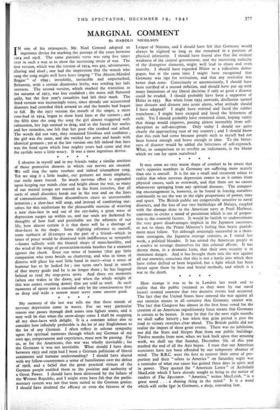I observe in myself and in my friends today a
similar attrition of those protective sheaves in which our nerves are encased. We still sing the same resolute and indeed triumphant song. Yet we sing it a little louder, our gestures are more emphatic, our smile more forced. So much nervous effort is expended upon keeping our minds clear and bright about the war, so many of our mental troops are massed in the front trenches, that all sorts of small disorders break out in the rear and on the lines of communication. Minor discomfitures cause us unreasonable irritation ; a shoe-lace will snap, and instead of comforting our- selves for this misfortune by the pleasurable exercise of weaving a new shoe-lace in and out of the eye-holes, a great wave of depression surges up within us, and our souls are darkened by thoughts of how frail and perishable are the adjuncts of our life, how almost certain it is that there will be a shortage of shoe-laces in the shops. Some slighting reference to oneself, some outburst of ill-temper on the part of a friend—which in times of peace would be dismissed with indifference or sympathy —looms sullenly with the bloated shape of mass-hostility, and the wind of the wings of persecution-mania brushes for a moment against the cheek. Even our sense of humour (that gay little companion who trots beside us chattering, and who in times of distress will place his cool little hand in ours)—even a sense of humour has to be looked for ; one turns one's head in search of that merry guide and he is no longer there ; he has lingered behind to read the stop-press news. And there are moments (when one wakes in the dawn, and when the whole weight of this war comes crushing down) that are cold as steel. At such moments of agony one is consoled only by the consciousness that so deep and wide a sorrow must serve some unseen good.
* * * *






















 Previous page
Previous page